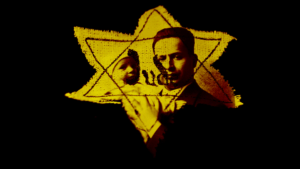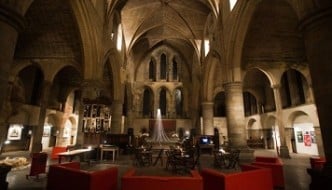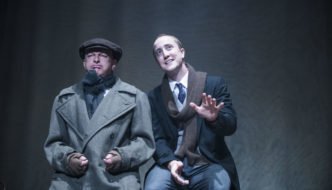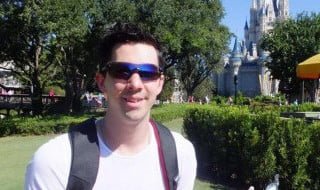
Jude (Dir. Amos Menin). Source: BFI
“We are going into the unknown,” writes Trude Feige. Her letter is being read in Jude, the latest film of director Amos Menin, which follows his great-grandparents as they abandoned their home in Dresden, fled to Czechoslovakia, and who, in a desperate bid of hope, put their two sons on a train to England. It was 1939 and the Feiges were Jews fleeing Nazi persecution. In the film, the now 89 year old John Fieldsend recounts these years and his escape, telling the story from the perspective of his seven year old self and sharing his childhood feelings for the first time.
“Despite doing many interviews over the years,” explains Amos Menin, “he said that no one has ever asked him how he felt.”
Receiving numerous accolades since its June 2020 completion, the ten minute documentary was selected for the UK Jewish Film Festival, Stratford Literary Festival, nominated for best documentary at the 14th BFI Future Film Festival, and has been nominated for an upcoming Royal Television Society Yorkshire award.
Jude is the third film of twenty year old Amos Menin, who is a final year student at the Northern Film School, but his first on this theme. Menin decided to make a film that would motivate its audience to stand against the rise of racism and facism, and after admiring the way that the 2019 film Jojo Rabbit played with form while criticizing the Nazis.
“Not giving that hatred power is a key thing for me,” explains Menin. “People can forget that this kind of thing happened within someone’s lifetime. You see people saying, ‘we can never forget’ and then they can often turn a blind eye to what is happening around them.”
Working with writer and producer Megan Decaluwe, Jude began as a larger production that would have created a very different film. Then, during last year’s lockdown restrictions, the team of two had to adapt to working from a distance with less equipment at their disposal, forcing the film’s now distinct style. Jude is built using four key elements: photographs, narration, film clips of railways, and light. The only colour included is on the mustard-yellow Star of David which Menin uses firstly to signify the end of Fieldsend’s time in Germany, and finally to end the film.
“I intended for the visuals to be supporting rather than taking over,” says Menin. “Because what was being said is so tragic and profound.” The film is painfully restrained as both director and narrator allow the audience’s imagination to swell in the unsaid. In one moment Fieldsend’s father Curt writes in a letter, “We will go bravely into the unknown, with the hope that we shall see you again.” In another, Fieldsend recounts that, “As the train was leaving my mother took her wrist watch off and passed it through the window to me and said, ‘This is for you to remember us by.’ I didn’t really understand.”
Jude then is a quiet instrument compared to the horror it contains, as Menin’s simplicity pushes against the Holocaust’s genocidal imagery that an audience will be more familiar with. Instead, he allows human encounters to work as sharp knives and balm: the doctor who says, “that cut needs a stitch, but I don’t stitch Jews,” or the anonymous Samaritan who sends Fieldsend his family’s photograph albums after the war.
Menin also omits explanation or commentary in the film. The audience does not find out, for example, that Fieldsend and his brother Arthur had escaped on the last Kindertransport out of Czechoslovakia, which had been organised by Sir Nicholas Winton. Nor does Menin explain the later life of Fieldsend, who converted to Christianity as a teenager and who worked as a vicar until his retirement. Without these situating details the film becomes a time capsule of grief, both for Fieldsend who recounts his family’s separation, and for his parents, as they chose to send their children away.
It is then soothing to learn that a further bond has formed between Fieldsend and Menin through the making of Jude.
“Having this understanding and the ability to work on something together has definitely made me feel closer to him,” says Menin. The two have been separated by distance with Menin growing up in rural Northumberland and his grandfather living in Oxfordshire.
“I’m just happy that I’m able to kind of carry this torch and keep the story going,” continues Menin. “And then hopefully pass it on to a new generation.”
As Jude ends no conclusions are offered, because there is no need for Menin to reach any. Instead the audience is left with an overriding admiration of the dignity and bravery of Trude and Curt Feige, while being moved by the storytelling of Fieldsend and Menin. In this way Menin has fulfilled his objective: the film lasts far longer than its ten minutes, stirring the audience with its quiet power and its sadness.
Updates on Jude can be found @judeshortfilm across Twitter, Instagram and Facebook. John Fieldsend’s book ‘A wondering Jew’ can be found here.
Filed under: Film, TV & Tech
Tagged with: BFI, BFI future film festival, British film, documentary, family, film festival, holocaust, independent film, interview, kinder transport, leeds, northern film, WWII, young filmmaker



Comments